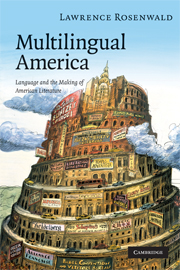Book contents
- Frontmatter
- Contents
- Preface
- Acknowledgments
- Introduction: techniques, methods, theses
- Chapter 1 Cooper's The Last of the Mohicans and the languages of America
- Chapter 2 Alfred Mercier, George W. Cable, and Louisiana French Creole
- Chapter 3 More than an echo, or, English in Yiddish in America
- Chapter 4 “New language fun,” or, on translating multilingual American texts
- Chapter 5 Towards a history of multilingual American literature
- Bibliography
- Index
Chapter 2 - Alfred Mercier, George W. Cable, and Louisiana French Creole
Published online by Cambridge University Press: 22 September 2009
- Frontmatter
- Contents
- Preface
- Acknowledgments
- Introduction: techniques, methods, theses
- Chapter 1 Cooper's The Last of the Mohicans and the languages of America
- Chapter 2 Alfred Mercier, George W. Cable, and Louisiana French Creole
- Chapter 3 More than an echo, or, English in Yiddish in America
- Chapter 4 “New language fun,” or, on translating multilingual American texts
- Chapter 5 Towards a history of multilingual American literature
- Bibliography
- Index
Summary
Enter even briefly the domain of creole studies, and one becomes aware of numerous passionate disputes. How should creole languages be written? Do they constitute a distinct class on linguistic grounds and not only on social and historical ones? What roles are played in their development by the native languages of the speakers developing them? Are their grammars simple or complex? Is African-American English a creole or not?
The disputes matter, the stakes in them are high. But beyond them and before them there is also a clear, tragic, and heroic truth. Creoles have often been created by slaves, and slaves have created them because they have been ripped away from their original language communities, thrown together with other slaves ripped from other communities, robbed not only of liberty but also of the use of their own language, made infantile or mute. “I had no person to speak to that I could understand,” wrote Olaudah Equiano, and spoke for many. Then, in that anguished and oppressed state, slaves forged new languages, cobbling them together from the versions and bits of their slave-masters' languages they had access to, from their own languages, from necessary and playful linguistic invention, from their deep human need to communicate. Creoles created by slaves bear witness both to the crime and practice of slavery and to the almost inexhaustible, untamable power of the linguistic imagination.
- Type
- Chapter
- Information
- Multilingual AmericaLanguage and the Making of American Literature, pp. 48 - 81Publisher: Cambridge University PressPrint publication year: 2008



